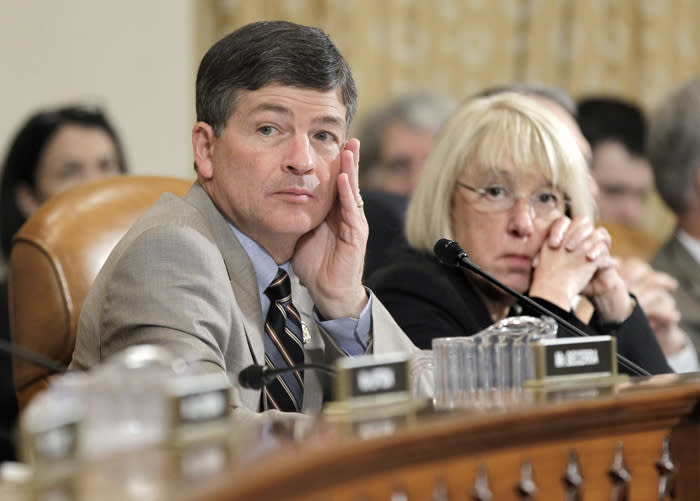 The Ticket
The TicketWhat you need to know about the supercommittee

In yet another race against the clock for Congress, time is quickly running out for the supercommittee of budget-conscious lawmakers to reach an agreement over how to cut a minimum of $1.2 trillion from the federal deficit over the next 10 years.
But why does it matter if they reach their deadline or how they do so? And who exactly is calling the shots?
Below, we explain the nitty-gritty of the super committee and why the next few days are so crucial for this panel.
Where did this supercommittee come from? The committee, formally known as the Joint Select Committee on Deficit Reduction (JSC) came into being this summer, when members of Congress were trying to agree on the conditions under which they would raise the debt ceiling. Fiscal conservatives brokered a deal that mandated any increase in the debt ceiling be accompanied by corresponding measures to tackle the federal deficit. Congress settled on baseline cuts of $1 trillion over the next 10 years--and then called for a new bipartisan committee to recommend another $1.2 trillion in cuts over the next decade. Federal lawmakers set the end of this year as the deadline for Congress to act on those recommendations.
Who sits on the committee? The JSC has 12 members--six Republicans and six Democrats, with each partisan group evenly divided with three senators and House members apiece. The party leadership in each chamber appointed the members. The co-chairs are Republican Rep. Jeb Hensarling of Texas and Democratic Sen. Patty Murray of Washington. The other 10 members are: Democratic Sen. Max Baucus of Montana; Democratic Rep. Xavier Becerra of California; Republican Rep. Dave Camp of Michigan; Democratic Rep. Jim Clyburn of South Carolina; Democratic Sen. John Kerry of Massachusetts; Republican Sen. Jon Kyl of Arizona; Republican Sen. Rob Portman of Ohio; Republican Sen. Pat Toomey of Pennsylvania; Republican Rep. Fred Upton of Michigan; and Democratic Rep. Chris Van Hollen of Maryland. The chairs hold authority in negotiations and messaging, but the panel's unique bipartisan and bicameral structure gives every member an equal say. What that means in practical terms is that at least seven of them have to agree in order to move their proposal forward.
So what are they doing? The committee is tasked with producing a plan to cut at least $1.2 trillion from the federal deficit and get it passed by the full Congress this year. Members are busy negotiating exactly how to make this happen in a way that will satisfy their party while also securing support from across the aisle.
But what are the sticking points? Committee members want the plan to reflect their values--Republicans are pushing back against tax increases while Democrats are opposing cuts to federal programs they believe are key. The main wrangling now taking place, not surprisingly, concerns the spending issues that usually divide the two parties: taxes, entitlement programs such as Social Security and Medicare, and unemployment benefits. Members are also debating how large to make this package ($1.2 trillion is the minimum directive) and whether to consider a backup plan that would sidestep the most contentious issues--effectively pushing the problem farther into the future.
And what's their deadline? You may have heard a lot about a Nov. 23 deadline. That's when the committee is supposed to announce its plan. But in actuality, the committee needs to submit its proposal to the Congressional Budget Office for vetting 48 hours before the committee votes on it. That means that if the panel keeps to its schedule--quite a big if at this late stage of negotiations--its submission deadline would be Monday, Nov. 21. The next big deadline will be Dec. 23--that's when Congress is provisionally scheduled to agree to a plan on an up-or-down vote. If that doesn't happen, the original debt ceiling accord provides for a series of automatic cuts to key spending programs to kick in by Jan. 2013.
What's at risk? Few find those automatic cuts palatable--some experts, including Defense Secretary Leon Panetta say they will cripple the country's defense system while others worry about their effect on federal programs. And that's why Office of Management and Budget Director Jack Lew says the committee will meet its deadline. A secondary concern is how the long-battered financial markets would react to the news that the committee had not met its appointed deadlines.
So is it "super?" While Washington is full of comics geeks, it would nevertheless be a mistake to regard the panel as "super" in the classic Marvel comics sense of the term. Instead, the prefix is meant to refer to the committee's unique bipartisan, bicameral makeup and the task at hand. Still, with plenty of blocked progress and partisan deadlocks slowing the panel's progress, this could well be a case for the ubernerd justice league known as the Mystery Men.
Other popular Yahoo! News stories:
Want more of our best political stories? Visit The Ticket or connect with us on Facebook and follow us on Twitter.


